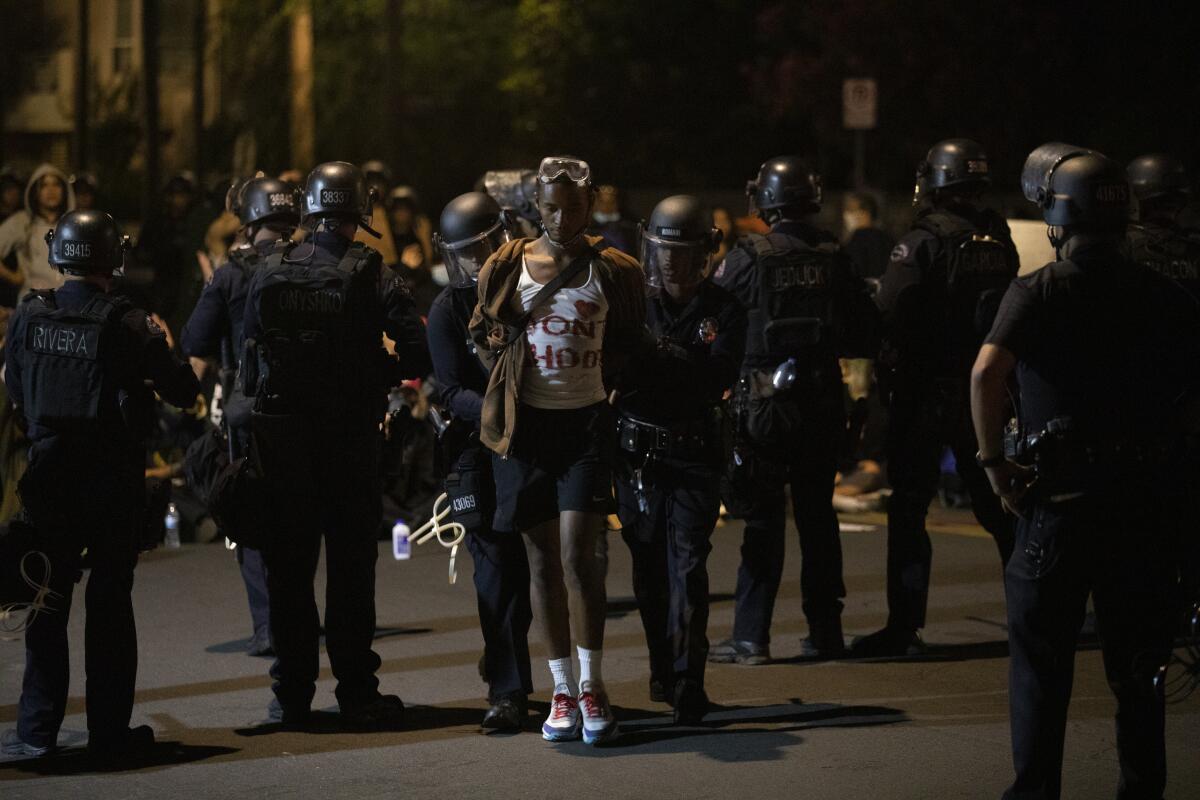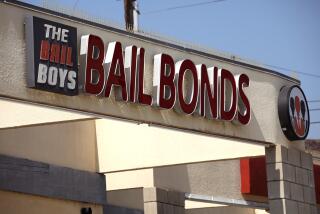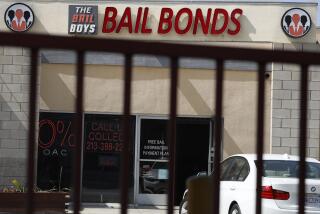L.A. County’s new $0 bail rule permits police to crack down on protesters, legal advocates say

The Los Angeles County Superior Court recently approved a temporary measure setting bail at $0 for most misdemeanors and low-level felonies. The move was intended to reduce jail populations in a bid to slow the spread of the coronavirus.
But several exemptions permit police departments to hold people on bail for misdemeanor offenses commonly associated with protests, including unlawful assembly and failure to disperse.
The new measure comes amid the fifth week of nationwide demonstrations over the police killing of George Floyd and other Black Americans, which have resulted in thousands of arrests in L.A. County alone.
The exceptions to the bail rule have alarmed advocates, prompting the possibility of legal action.
“It’s hard to imagine a clearer violation of the First Amendment,” longtime civil rights attorney Carol Sobel said Monday upon learning of the revised bail rules. Sobel has won several large lawsuits against the LAPD over its handling of protests and is currently helping sue over the department’s response to the Floyd demonstrations.
“What this would mean is if you shoplifted, you would get out, but if you came together to have your voices heard, you’d be held in jail. This is just absurd.”
So far, no police department has used the revised measure as a reason to hold protesters on bail, legal observers say, but many fear it’s simply a matter of time.
“It was sort of like a bomb we saw,” said Kath Rogers, executive director of the National Lawyers Guild of Los Angeles. “We knew it was aimed at the protesters, but we’re just waiting for it to be used.”
L.A. County first implemented a $0 bail requirement March 27, as the number of coronavirus cases recorded by local public health officials began to climb rapidly. The aim was to cut down on the number of people held in pretrial custody due to concern the virus could spread rapidly through crowded jail facilities and courthouses, straining limited resources.
Ten days later, that was replaced by a statewide $0 bail rule approved by the Judicial Council, the policy-making arm of the state courts system.
The statewide schedule listed a little over a dozen exceptions to the $0 bail rule, most of them violent crimes, sex offenses or firearms violations.
When the Judicial Council voted to rescind the measure effective June 20, the L.A. County Superior Court passed a revised $0 bail rule. The list of exceptions grew to more than 50. Among them are 18 misdemeanor charges for which police can now elect to hold people on bail, including unlawful assembly, unauthorized entry into an emergency area and failure to disperse.
“It’s pretty obvious when you look at what they’re exempting,” said John Raphling, an attorney and senior researcher with Human Rights Watch’s U.S. program. “At least three of them in particular are targeting protests. Just plain and simple.”
The bail schedule was reviewed and approved by the Superior Court’s bail committee and executive committee, public information officer Mary Eckhardt Hearn said in an email.
“The Zero Bail Schedule was unanimously approved by the Executive Committee after discussion and consideration of various factors,” Eckhardt Hearn wrote. “The Executive Committee, which is made up of judges and commissioners, concluded that the exemptions were appropriate.”
Sobel said that, in addition to violating the Constitution by singling out protected activity, the county’s bail schedule also runs contrary to state law, which requires that people accused of most misdemeanors be either cited in the field or booked and immediately released. The law lays out exceptions for certain offenses, mostly violent crimes, as well as for people who are deemed at high risk of reoffending or endangering others. But the L.A. County bail schedule goes further and adds a number of exceptions beyond those listed in state law, including the charges related to protests, she said.
“This is just astonishing to me,” Sobel said. “In order not to release someone, they must have a very specific reason that is created by state law. They can’t create a new reason here in Los Angeles.”
Adding to activists’ concerns is the fact that police already have a great deal of discretion when it comes to arresting people on a charge of unlawful assembly, they said.
“The police declare the unlawful assembly. They make the decision to decide that a protest has become an unlawful assembly,” Raphling said. “And while they may not be able to justify it in the future when it’s reviewed in court, there’s nothing at the time of the protest to question their use of discretion.”
For that reason, he said, the charge gives police the power to make mass arrests.
“Adding that now, they can hold the people they arrest in custody, which aside from being wrong and arguably a violation of First Amendment rights is also exposing people to often brutal conditions — and in particular now to COVID-19,” he said.
Advocates have been closely watching how police interpret the new rules since they took effect less than two weeks ago. Staff with the National Lawyers Guild’s legal observer program have been monitoring protests, including 10 to 15 actions that took place over the weekend, to ensure that arrestees are released promptly, Rogers said.
That’s happened in every case except one, she said.
When Beverly Hills Police arrested 28 protesters during a demonstration early Sunday, most of them on suspicion of unlawful assembly, they initially said the demonstrators would be held on $5,000 bail, likely meaning they’d be jailed for the weekend pending an appearance before a judge.
Following an outcry from the National Lawyers Guild, which called for the protesters to be freed, the police department reversed course and said the majority of them would instead be cited and released. Still, many were jailed upward of 19 hours as they were processed and booked.
“This is the only arrest situation in recent weeks or the past month where people have not just been [immediately] released on their own recognizance, and it’s been a fight to get them out, which is ridiculous,” Rogers said. “But I’m hopeful that other jails and other jurisdictions are going to see that people are not going to accept this.”
Sobel said Monday that she was considering taking legal action against the bail schedule but first planned to file a demand letter asking the court to rescind the exemptions related to protests.
“You can’t penalize First Amendment activity in this way at all,” she said. “And you certainly can’t penalize it more than you would other alleged crimes that have no protective constitutional value.”
More to Read
Start your day right
Sign up for Essential California for news, features and recommendations from the L.A. Times and beyond in your inbox six days a week.
You may occasionally receive promotional content from the Los Angeles Times.







